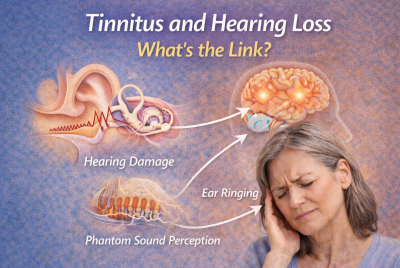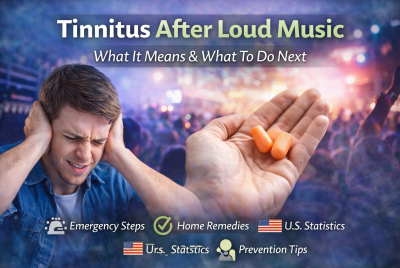Tinnitus After Cold: Causes, Treatments, and Relief Tips for Ringing Ears
Tinnitus After Cold – Why That Ringing Just Won’t Go Away
If you’ve ever recovered from a bad cold only to notice a persistent ringing in your ears, you’re not alone. Many people experience tinnitus after a cold, where sounds like buzzing, whooshing, or high-pitched tones appear or worsen once congestion and infection symptoms begin to clear.
For some, this ear noise fades within days. For others, it can linger for weeks—or sometimes longer. Whether you hear a faint background hum or a loud, constant tone, the experience can be frustrating and may affect concentration, sleep, and mood.
In this guide, you’ll learn why tinnitus can follow a cold, what recovery usually looks like, how to manage symptoms safely, and when medical evaluation may be important.
What Is Tinnitus After A Cold?
Tinnitus is not a disease itself but a symptom—often described as ringing, buzzing, clicking, or whooshing sounds—that can result from changes in the auditory system.
When tinnitus appears after a cold, it is commonly linked to:
• Inflammation in the ear or Eustachian tube
• Fluid buildup behind the eardrum
• Pressure changes affecting sound transmission
• Temporary irritation of inner ear structures
Colds, sinus infections, and flu viruses can all create these conditions. While many cases improve as the body heals, some people experience longer-lasting tinnitus that may need medical evaluation.
What Tinnitus After A Cold Often Feels Like In Real Life
Many people notice that tinnitus appears as cold symptoms start improving, not always during peak congestion.
Common patterns people report include:
• Ringing starts when sinus pressure begins clearing
• Ear fullness is improving, butthe ringing remains
• Ear noise is louder in quiet rooms after illness recovery
• Symptoms fluctuating during the recovery week
Some people also notice tinnitus is:
• Milder during busy daytime hours
• More noticeable at night
• Worse when tired or dehydrated
These patterns often reflect temporary pressure or nerve sensitivity changes rather than permanent hearing damage.
Causes Of Tinnitus After A Cold
1. Eustachian Tube Dysfunction (ETD)
The Eustachian tube connects the middle ear to the back of the throat. During a cold, swelling or mucus can block this tube, trapping pressure and fluid. This pressure imbalance can trigger tinnitus.
2. Middle Ear Infections
A secondary ear infection after a cold can inflame the middle ear and cause ear buzzing or temporary hearing changes.
3. Inner Ear Irritation
Some viruses can irritate inner ear structures like the cochlea or auditory nerve, which may produce high-pitched tinnitus sounds.
4. Sinus Congestion And Pressure
Blocked sinuses can create pressure differences that affect the ear canal and middle ear function.
Self Check: Is Your Tinnitus Likely Cold-Related?
You may be experiencing post-cold tinnitus if:
• Ringing started during or shortly after a cold
• You had sinus pressure or ear fullness
• Hearing feels slightly muffled
• Symptoms slowly improve over days or weeks
Less typical warning signs include:
• Sudden severe hearing loss
• Strong dizziness or balance problems
• Severe one-sided tinnitus with no congestion history
If these occur, a medical evaluation is important.
Typical Recovery Timeline After A Cold
First 3–7 Days After Cold
• Pressure imbalance is common
• Temporary tinnitus possible
Week 2–3
• Many cases improve naturally
• Brain and ear pressure systems re-adjust
After 4–6 Weeks
• Persistent tinnitus should be medically evaluated
Longer symptoms do not automatically mean permanent tinnitus, but evaluation helps rule out complications.
Cold-Related Tinnitus Vs Other Types
Cold-Related Tinnitus
• Often temporary
• Linked to congestion
• Improves gradually
Ear Infection-Related Tinnitus
• Often painful
• Fever may be present
• Needs treatment
Noise Exposure Tinnitus
• Often sudden
• May follow a loud sound event
• May persist longer
Why Tinnitus May Feel Stronger During Illness Recovery
During recovery, the nervous system may be more sensitive. Inflammation, fatigue, and stress hormones can temporarily increase how strongly the brain notices internal sounds.
This is one reason tinnitus may appear or seem louder after illness.
Common Symptoms You Might Notice
• Ringing, buzzing, or humming in one or both ears
• Ear fullness or pressure sensation
• Temporary muffled hearing
• Ear popping when swallowing or yawning
• Symptoms are worse at night due to less background noise
When Monitoring At Home Is Reasonable
• Symptoms started during a cold
• Symptoms are gradually improving
• No major hearing changes
• No dizziness
When To See A Doctor
• Tinnitus lasts longer than 4–6 weeks
• Sudden hearing loss
• One-sided severe tinnitus
• Balance problems
• Severe ear pain or fever
Treatment Options For Tinnitus After A Cold
1. Home Remedies And Self Care
• Stay hydrated to help thin mucus
• Use a saline nasal spray to relieve sinus congestion
• Apply a warm compress near ear area
• Chew gum or yawn to help open the Eustachian tube
2. Over The Counter Relief
• Decongestants may reduce nasal swelling
• Antihistamines may help if allergies contribute
• Pain relievers may help with discomfort
Always follow label directions and consult a doctor if unsure.
3. Medical Treatments
If infection or fluid is confirmed, doctors may prescribe:
• Antibiotics for bacterial infection
• Steroid nasal sprays
• Fluid drainage procedures in rare chronic cases
Coping With Ongoing Tinnitus After A Cold
If tinnitus continues after recovery, management tools can help reduce its daily impact.
Sound Therapy And Masking
• White noise machines
• Tinnitus sound apps
• Background environmental sounds
Stress Management
• Deep breathing exercises
• Mindfulness meditation
• Gentle yoga or stretching
Hearing Aids With Tinnitus Features
Helpful for people who also have hearing loss.
What Many People Expect Vs What Usually Happens
Expectation:
Tinnitus disappears the moment the cold ends.
Reality:
The ear and brain may need time to rebalance after illness. Gradual improvement is common.
Prevention Tips
• Treat colds early to reduce congestion duration
• Avoid loud noise exposure during recovery
• Limit caffeine and alcohol if they worsen symptoms
• Support immune health with sleep, nutrition, and exercise
Real Life Coping Strategies
• Background TV or radio while falling asleep
• Short outdoor walks to shift attention away from tinnitus
• Keeping a symptom journal
• Joining support communities
FAQs About Tinnitus After A Cold
How Long Does Tinnitus Last After A Cold?
Many cases improve within days to weeks. If it lasts longer than several weeks, a medical evaluation is recommended.
Can A Cold Cause Permanent Tinnitus?
Rare, but possible if complications affect inner ear structures.
Will Antibiotics Cure Tinnitus After A Cold?
Only if caused by bacterial infection. Viral causes do not respond to antibiotics.
Does Flying After A Cold Make Tinnitus Worse?
Pressure changes may temporarily worsen symptoms.
Are Supplements Helpful?
Some people explore magnesium, zinc, or herbal supplements, but results vary. Always consult a healthcare professional first.
Final Takeaway
Tinnitus after a cold is often temporary but can feel distressing while it lasts. Managing congestion, supporting recovery, and using sound therapy or relaxation tools can help reduce symptoms.
If tinnitus persists, worsens, or appears with other concerning symptoms, medical evaluation is recommended.
Many people experience gradual improvement over time.
Disclaimer
This content is for informational purposes only and does not replace professional medical advice. Always consult a qualified healthcare provider for diagnosis and treatment decisions. Seek urgent care for sudden hearing loss, severe pain, or neurological symptoms.







